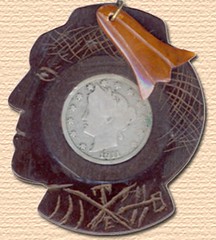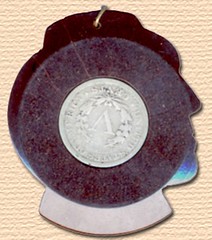
PREV ARTICLE
NEXT ARTICLE
FULL ISSUE
PREV FULL ISSUE
NOTES FROM E-SYLUM READERS: FEBRUARY 1, 2015Stubenrauch Tokens & Medals
To read the earlier E-Sylum article, see:
More on Encased Coins

 Regarding the bakelite encasement Frank Van Valen wrote about, Bob Leonard writes: I've never seen this item before, but it looks like some kind of summer camp project. Also, I don't see how Frank can date it to 1911, since the nickel is worn to only G-VG condition; I'd date it closer to 1940 or even 1950, and suspect that the holder was intended for a BUFFALO nickel, but someone decided to substitute one of the old Liberty Head nickels instead. I have seen a lot of encased coins over the past 40 years. Normally the encasement is aluminum or less commonly brass. I have also seen modern plastic encasements. The coins are usually pennies, though I have seen nickels and quarters, and I have seen Canadian large and small cents encased. I also once had a small Swiss coin encased -- issued for the centennial of a Swiss community here in the USA. The encasements are normally round or horseshoe shaped, but other shapes are known -- the rarest of which is in the shape of a teddy bear. I have sold a few 1948 encased cents, issued for the centennial of Wisconsin statehood, in which the encasement was in the shape of the state. But I have never seen or heard of a bakelite encasement nor of an encased V nickel. No doubt you will hear from Alan Weinberg, who is the king of encased coin collectors. Alan V. Weinberg writes: To quote the late great John J. Ford, Jr: "cockamamie". To read the earlier E-Sylum article, see:
Information on Phares O. Sigler Sought
I wonder if any E-Sylum readers can provide any background information on Phares O. Sigler (1899-1974), best known for his 1951 Numismatic Bibliography and his many articles on primitive money in The Numismatist and Numismatic Scrapbook. He is less well known as the author of the first book (in any language) on Chinese sycee silver ingots (1943). He was a Colonel in the J.A.G.C. (Judge Advocate General Corps) and lived in Silver Spring, Maryland. I found an article he wrote on Japanese netsuke in 1974, so he must have had interests beyond numismatics. There wasn't much more than this in Pete Smith's American Numismatic Biographies, and nothing in John Lupia's
online Encyclopedic Dictionary of Numismatic Biographies? (which has a 1940 cutoff). Can anyone help? -Editor
Notes and Coins Will Be Overtaken By Cashless Payments
David Pickup forwarded this depressing news for numismatists. -Editor
Banknotes and coins will be less popular than digital money by early March as cashless payments overtake cash transactions for the first time, analysis by The Times suggests. The surging popularity of contactless credit cards and fast online bank transfers has reduced our reliance on physical currency, official figures show. The Payments Council, which oversees all payment services in Britain, predicts that 400 million fewer cash transactions will be made this year than last. David adds: Perhaps as cash goes there will be more use for tokens. People do not like using card payments for car parking for example. To read the complete article, see:
Image of the Macerated Currency bust of George Washington
Steve Tanenbaum asked me to appraise the damaged George Washington macerated currency bust, to put a dollar value on said damage. Steve Hayden's recollections match mine. What no one has mentioned thus far is that the piece was made for the 1932 birth centennial, rather later than the norm for macerated currency souvenirs. As for Tanenbaum's skills as a package maker... I would occasionally let Steve T use my mailing table. Not a good idea. Once, having slathered a box with multiple pounds' worth of wet paper tape, he put it down on the table, on top of some 2x2 paper envelopes, containing thin jettons. These stuck to the bottom of the box and he unknowingly carried them off. Some were recovered. When my lease ends and I dis-assemble the table, I may recover more. There may be as many Tanenbaum stories as Walter Breen stories. Steve Hayden writes: I found the picture. It is on page 31 of Dave Bowers's book A Guide Book of Washington And State Quarters. ![Washington, George-Houdon bust pic [SLT and Steve Hayden]](https://farm9.staticflickr.com/8561/16409066051_a9ba9c7ff5_m.jpg) ![1932-Houdon bust in papier mache [SLT and Steve Hayden]-1](https://farm8.staticflickr.com/7357/16409066181_b40bbc1d2b_m.jpg) Dave Bowers kindly forwarded the above images. On the left is the famous original Houdon bust of Washington; on the right is the
macerated currency version. -Editor
To read the earlier E-Sylum article, see:
Crowd-Sourcing a Medallic Visual Dictionary
This seems like the perfect project for crowd-sourcing input: place the image(s) on-line, and let people tag them the way they do other pictures. The cataloger (curator-webmaster, really) could incorporate most or all of the suggestions into a series of hierarchical look-ups which could borrow liberally from heraldry (e.g. animal => dog => greyhound => "passant" => "sinister" => "regardant"), to facilitate searching. I can't imagine, given the scope of the subject, that this would work anywhere EXCEPT on-line: has anyone got a rough idea how many medals there are? Yeah, I didn't think so... Anyway, putting "greyhound" & other terms (the particular metal, orientation, shape, and/or size) into the site's search engine would grab all images so-tagged: then you'd have a visual dictionary of sorts. To read the earlier E-Sylum article, see:
The Euro and Monetary Unions in History
The victory of Syriza in Greece is a major event for the history of Euro. Will it be a rebirth of the monetary union of the beginning of the end? We are now working on a European application on monetary unions in history. You can find a website on a previous program on http://www.emu-cost.net/, documents and videos on our actual program (on the collapse of the 19th monetary union) on DAMIN ( www.anr-damin.net) and the publications of Moneta ( www.moneta.be). Georges adds: We will have a meeting in May in Copenhagen (28-29 May) on the question of the technology of minting, mainly 19th century but some papers concern other periods. It will take place at the Royal Museum. Attendance is free. Abstracts on www.anr-damin.net Query: First Use of Term 'Permanently Impounded' Sought
Can a coin be criminal? We read, especially in auction descriptions, the cliché "permanently impounded". What is the history of this banal usage in numismatics? I would speculate (totally gratuitously) that it was sour grapes from B. Max Mehl, annoyed at losing a consignment to a charitable donation. Or maybe Tom Elder, annoyed at spilling a drink. To read the earlier E-Sylum articles, see:
Correction: 100 Times Estimate
The 1796 cent sold on Wednesday 21st by Salisbury, Wiltshire (United Kingdom) auctioneers Woolley & Wallis. It was estimated at £500-700 The coin hammered for £48,000, over ten times estimate. Rich Hartzog writes: Well, no, try 96 times low estimate. Oops. Looks like I dropped a zero - it's indeed more like 100 times the low estimate. Good catch. Sorry. -Editor
To read the earlier E-Sylum article, see:
Warning: SHOPPERZ Malware
While searching in Google, I came across an article titled "Money in Ancient China" and clicked on it. Big mistake. There was no article, but it downloaded a site or program called SHOPPERZ which plastered the screen with pop-up ads. As fast as you click them to go away, another would appear. These pop-ups appeared mostly when I was on eBay, but when I was at other sites, they didn't show up at all. I ran Kaspersky twice, but it didn't solve the problem. Finally had to call the Geek Squad at Best Buy (definitely worth the $100 a year for the personal service). They managed to fix the problem, but it took "Steven B2" seven hours (poor guy). I was sitting at the screen too, expecting it would take up to an hour to fix (poor me). Anyway, all is well now. Wayne Homren, Editor The Numismatic Bibliomania Society is a non-profit organization promoting numismatic literature. See our web site at coinbooks.org. To submit items for publication in The E-Sylum, write to the Editor at this address: whomren@gmail.com To subscribe go to: https://my.binhost.com/lists/listinfo/esylum All Rights Reserved. NBS Home Page Contact the NBS webmaster 
|
